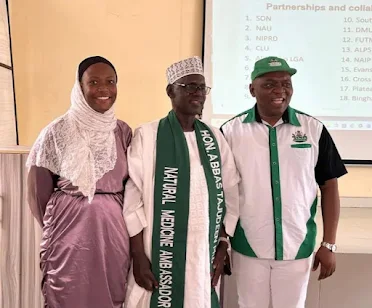· Highlights Potential Of Plant-Based Medicines For Export Earnings
The Federal Government has renewed its commitment to enhancing the Nigeria Natural Medicine Development Agency's (NNMDA) initiatives in natural medicine production, regulation, and promotion. It expressed optimism in the potential of Nigeria's plant-based medicines to significantly contribute to export earnings.
Alhaji
Yusuf Ahmed-Badau, Chairman of the House Committee on Legislative Compliance,
gave the assurance during a working visit to NNMDA headquarters in Lagos,
saying the move would enhance healthcare delivery and boost access to
affordable drugs.
Ahmed-Badau
asserted that if the country’s natural medicine is well and properly developed,
it would reduce the dependence on foreign and imported medicines, assuring that
the lawmakers were ready to support the agency’s drive to develop comprehensive
natural medicine.
According to the legislator, the development of natural medicine on a large scale will create massive job opportunities across the country.
Ahmed-Badau
said, “This move by the NNMDA to develop and promote traditional medicine is
encouraging. This will reduce costs and dependence on foreign medicine.
“So,
at the same time, this plan will help our teeming youths by creating job
opportunities in our communities across the country.
“The
NNMDA DG has informed us of their plans, and the only thing is to encourage
them to formalise everything in writing and submit it to us. We’ll take it from
there and put it into action,” the committee chairman said.
Speaking
earlier, Prof. Martins Emeje, Director-General, Director-General, who appealed
for increased support to advance the agency’s development roadmap, urged the
House to approve a special allocation for the development of natural medicine.
Emeje
said with the lawmaker’s support, Nigerians could be liberated from the
overdependence on foreign medicines.
“Nigerians
are finally about to be liberated from the shackles of colonialism and
overdependence on the importation of medicines that are indigenous to other
people,” the professor said.
He
said that with the right allocation and improved staff strength, the country
could explore natural medicines from each local government to treat diseases or
infections peculiar to the LGs.
The NNMDA boss explained that diseases in every location across the country have something to do with the natural constitution of that environment.
“For
each ward, local government, or state, there are peculiar plants, animals, and
minerals that cannot be found somewhere else.
“It
is the plants, animals, and minerals in that community that can be explored for
medicine for diseases found in that community,” Emeje added.
 |
Alhaji Yusuf Ahmed-Badau, Chairman of the House Committee on Legislative Compliance; Prof. Martins Emeje, Director-General of the Nigeria Natural Medicine Development Agency (NNMDA); and Barakat Muritala, Best NNMDA Intern, during the House Committee on Legislative Compliance's working visit to the NNMDA headquarters in Lagos on Wednesday.
The
committee’s working visit is coming months after the House adopted a motion on
the “need for Nigerians to promote and prioritise natural medicine” in the
country.
The
motion was sponsored by the member representing Ikono/Ini Federal Constituency,
Akwa Ibom State, Mr Emmanuel Ukpong-Udo.
Udo,
in a brief synopsis of the motion, noted that globally, the present-day
healthcare enterprise leans more towards nature-based remedies, “and this is
without exception to any known human ailment.”
“Natural
medicine is the most accessible and preferred healthcare delivery system in
most communities in Nigeria today.
“We
are worried that the country could not make the necessary achievements by
making traditional medicine subservient to imported medicine,” he submitted.
After
adopting the motion, the House mandated its committees on Healthcare Services
and Science and Technology to “strategise with stakeholders and the Natural
Medicine Development Agency.”
It
further tasked the Committees to “connect the possibilities of natural
medicine, reorient Nigerians, and look inwards for solutions to health
challenges.”





